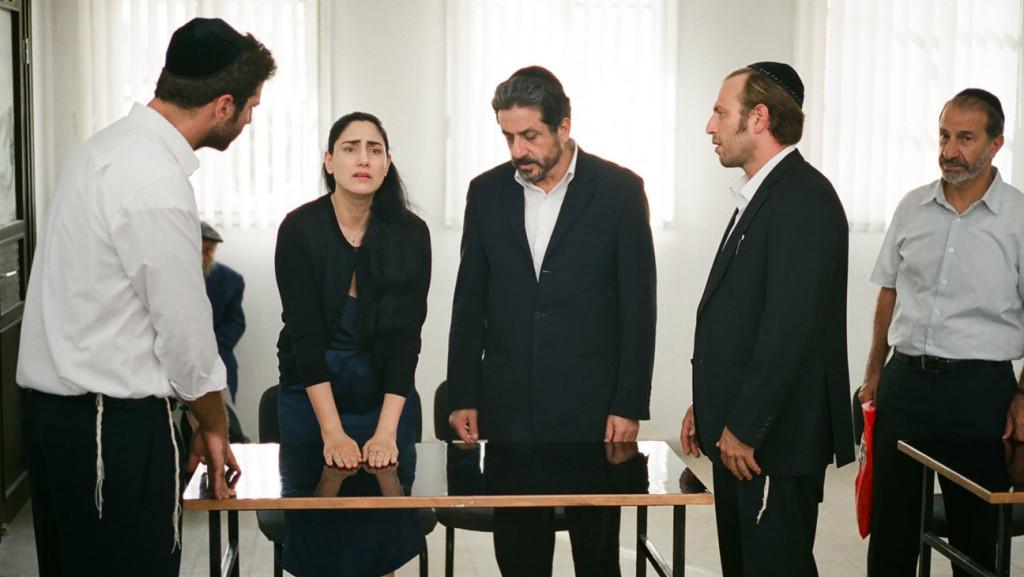An Israeli woman seeking to divorce her husband can only do so if the husband consents to grant her a “gett,” a document that nullifies adultery laws and restores all her legal rights. But should he refuse to do so, the only other option is to let a tribunal hear “the facts of the case” before deciding their fate, all the while aware that the deck is stacked in the husband’s favor.
These biased precedents serve as the backdrop for “Gett: The Trial of Viviane Amsalem,” a courtroom drama concentrating on the oppressive, male-dominated culture that society has manufactured. The final installment in a trilogy revolving around marital strife, “Gett” follows beleaguered hairdresser and mother of four Viviane Amsalem (Ronit Elkabetz), who left her conservative husband Elisha (Simon Abkarian) three years prior to the beginning of the film and is now filing for a divorce. Speaking on her behalf, lawyer Carmel Ben Tovim (Menashe Noy) explains to the three rabbinical judges that Viviane simply does not love her husband anymore and has no desire to remain married. Elisha, having chosen to represent himself, refuses to grant her a divorce, prompting the judges to arbitrate that Viviane is to reconcile with Elisha, move back in with him and return to court in six months’ time. Little do they all know they are about to embark on a harrowing five-year journey that will test the country’s system of government like never before.
Although the setup is eerily similar to the archetypal platform for an episode of Dick Wolf’s crime drama “Law and Order: Special Victims Unit,” which primarily deals with crimes of a sexual nature, “Gett” focuses instead on women standing up for their individual rights in a country where men have the final say in everything. As well as writing and directing “Gett” alongside her brother Shlomi, Elkabetz is undoubtedly the film’s most compelling element, primarily due to the fact that her character is in every scene. She successfully manages to embellish Viviane’s persistence in the face of adversity while, at the same time, creating a believable character that female viewers can identify with. Elkabetz also accomplishes the almost difficult task of captivating audience members with her first-class acting skills, a fact that is asserted when her character breaks down in front of the court, calling out the judges, decrying the proceedings and denouncing God in one fell swoop.
Elkabetz’s chemistry with Abkarian, who does a magnificent job in portraying the stubborn
husband, and Noy, whose performance as Carmel nearly steals the show, keeps the story going down to the riveting final scene. The three judges, portrayed by Eli Gornstein, Rami Danon and Roberto Pollak, do not disappoint, each giving a performance that is filled with contempt over the so-called “divorce proceedings.” Viviane’s brother-in-law, Rabbi Shimon (Sasson Gabai), also does not fail to satisfy, bringing to life an egotistical Orthodox teacher who goes so far as to insinuate that Viviane is engaged in a passionate affair with Carmel. However, by the time the film ends, Elkabetz stands out above the rest due to the range of emotions that she subtly conveys.
Cinematographer Jeanne Lapoirie, best known for her work in Francois Ozon’s 2002 dark-comedy musical “8 Women,” contributes to the film’s finesse by making it appear as if the viewers are trapped inside the claustrophobic hallways and waiting rooms of the religious court, a technique that can be compared to the one used in the 1957 film adaption of the Reginald Rose play, “Twelve Angry Men.” From start to finish, the deliberate placement of each shot works flawlessly to tell the story while keeping the viewers on the edge of their seats.
The running time, which is estimated to be close to two hours, feels longer because some scenes near the film’s midpoint make it seem like the siblings lengthened them in order to counteract the scenes where there was just dialogue. However, this one issue is minor and ultimately inconsequential to the film as a whole.
Despite this one minute flaw, “Gett: The Trial of Viviane Amsalem” is a film worth seeing. It offers a fresh perspective on the issue of gender equality, forcing the audience members to put themselves in the characters’ positions and ask themselves if one man’s pride is more important than a woman’s rights. Anyone on this planet, man or woman, whose rights have been denied because of their race, religion or sexual orientation will find “Gett” to be a truly inspiring piece, one that’s sure to shed a little more light on the issues of equality in society and in the world today.




















